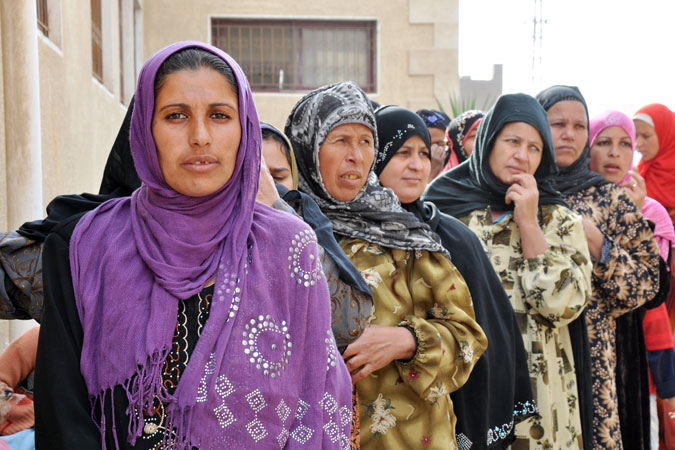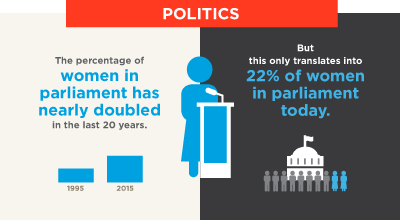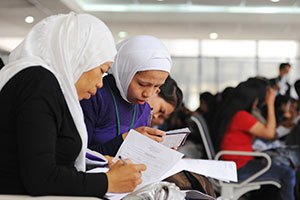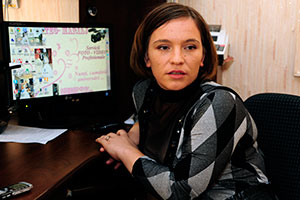SDG 10: Reduce inequality within and among countries

Targets
- By 2030, empower and promote the social, economic and political inclusion of all, irrespective of age, sex, disability, race, ethnicity, origin, religion or economic or other status.
- By 2030, progressively achieve and sustain income growth of the bottom 40 per cent of the population at a rate higher than the national average.
- Ensure equal opportunity and reduce inequalities of outcome, including by eliminating discriminatory laws, policies and practices and promoting appropriate legislation, policies and action in this regard.
- Adopt policies, especially fiscal, wage and social protection policies, and progressively achieve greater equality.
- Improve the regulation and monitoring of global financial markets and institutions and strengthen the implementation of such regulations.
- Ensure enhanced representation and voice for developing countries in decision-making in global international economic and financial institutions in order to deliver more effective, credible, accountable and legitimate institutions.
- Facilitate orderly, safe, regular and responsible migration and mobility of people, including through the implementation of planned and well-managed migration policies.
- Implement the principle of special and differential treatment for developing countries, in particular least developed countries, in accordance with World Trade Organization agreements.
- Encourage official development assistance and financial flows, including foreign direct investment, to States where the need is greatest, in particular least developed countries, African countries, small island developing States and landlocked developing countries, in accordance with their national plans and programmes.
- By 2030, reduce to less than 3 per cent the transaction costs of migrant remittances and eliminate remittance corridors with costs higher than 5 per cent.
Inequalities have widened across and within many countries, even amid high rates of economic growth. Disparities, caused by practices within countries and in the global economy, are unjust and weaken the social fabric.
Today, more women are in the workforce, in politics, in leadership roles, breaking stereotypes and societal taboos. Yet, gender discrimination makes women prone to deeper disparities. Globally women earn 24 per cent less than men, with varied gaps between countries.[1] They are also more likely than men to be in vulnerable employment, with up to 75 per cent of women’s jobs being informal or unprotected in developing countries.[2] Worldwide, 83 per cent of domestic workers are women—most are not legally entitled to a minimum wage.[3]

Further, gender discrimination can intersect with other types, such as regarding age, disability ethnicity, economic status and so on, multiplying the burden of inequalities many times over. Social norms that treat women as second-class citizens in many cases translate into structural obstacles to progress, such as laws that fail to punish perpetrators of gender-based violence. Or budgets that do not fund the services women need most.
Whether the issue is fiscal policy or safe migration or improved regulation of global financial markets, different and potentially unequal outcomes for women and men must be recognized. Only then can deliberate actions be taken to correct them, within and across countries.
UN Women works to reduce inequality within and among countries through advocacy for decent work, social protection and gender-sensitive economic policies around the world. The entity’s mandate is focused on empowering women and reducing gender inequality in all spheres, whether by eliminating discriminatory laws, policies and practices or promoting appropriate legislation, policies and actions. UN Women advocates for employment policies that improve labour market conditions and advance decent work for women, as well as making sure domestic workers can migrate safely and receive social protection.
Stories
Towards safer work and migration for women
UN Women supports advocacy for national economic and social policies and legislation to regulate migration and protect women migrant workers, as well as frontline services, information and capacity-building. A new UN report details global efforts and persisting gaps in addressing violence against women migrant workers.
Reaching out with public services across rural Moldova
Offering advice on the job market, agriculture and land laws, the innovative “one-stop shop” model has already helped more than 10,000 women and men, in Moldova’s countryside.
Notes
[1] UN Women (2015), Progress of the World’s Women 2015-2016: Transforming economies, realizing rights, Chapter 2.
[2] Ibid.
[3] International Labour Organization (2011), Global and Regional Estimates on Domestic Workers (Policy Brief No. 4), p. 6.

